

The Australian Privacy Foundation. Means for ascertaining the location of a computing device have matured rapidly recently, and include GPS, Wifi, and triangulation within mobile phone cells.
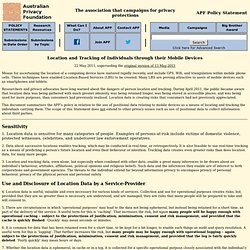
These techniques have enabled Location-Based Services (LBS) to be created. Many LBS are proving attractive to users of mobile devices such as smartphones and tablets. Researchers and privacy advocates have long warned about the dangers of person location and tracking. During April 2011, the public became aware that location data was being gathered with much greater intensity, was being retained longer, was being stored in accessible places, and was being used for more purposes, than consumers had previously realised.
Location data is creating risks that consumers had not previously appreciated. This document summarises the APF's policy in relation to the use of positional data relating to mobile devices as a means of locating and tracking the individuals carrying them. Sensitivity 1. 2. 3. 4. 5. 6. 7. 8. 9. 10. 11. 12. 13. 14. Consent. Newest YouTube user to fight a takedown is copyright guru Lawrence Lessig. Illegitimate or simply unnecessary copyright claims are, unfortunately, commonplace in the Internet era.
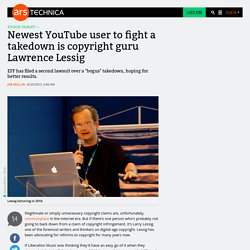
Watch Getting the Network the World Needs. Not Smart: Warner Music Issues DMCA Takedown On Larry Lessig Presentation. If there were anyone out there to whom you would not want to send a random takedown notice for an online video, it would probably be Larry Lessig.
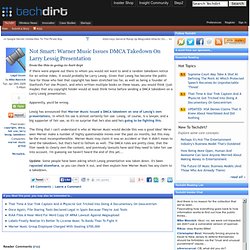
Given that Lessig has become the public face for those who feel that copyright has been stretched too far, as well as being a founder of Stanford's Fair Use Project, and who's written multiple books on these issues, you would think (just maybe) that any copyright holder would at least think twice before sending a DMCA takedown on a Larry Lessig presentation. Apparently, you'd be wrong. Lessig has announced that Warner Music issued a DMCA takedown on one of Lessig's own presentations, in which his use is almost certainly fair use. Lessig, of course, is a lawyer, and a big supporter of fair use, so it's no surprise that he's also said he's going to be fighting this. The thing that I can't understand is who at Warner Music would decide this was a good idea? Update: Some people have been asking which Lessig presentation was taken down.
Lawrence Lessig strikes back against bogus copyright takedown. The Electronic Frontier Foundation (EFF) today filed suit against an Australian record company for misusing copyright law to remove a lecture by Harvard Law School professor Lawrence Lessig from YouTube.
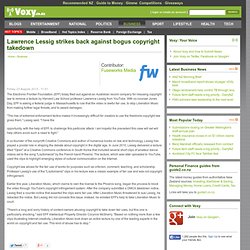
With co-counsel Jones Day, EFF is asking a federal judge in Massachusetts to rule that the video is lawful fair use, to stop Liberation Music from making further legal threats, and to award damages. "The rise of extremist enforcement tactics makes it increasingly difficult for creators to use the freedoms copyright law gives them," Lessig said. "I have the opportunity, with the help of EFF, to challenge this particular attack. Lawrence Lessig Sues Over Takedown of YouTube Video Featuring Phoenix Song. Chilling Effects Clearinghouse. Mixing Apples And Forums. Terms & Conditions and Privacy Statement.
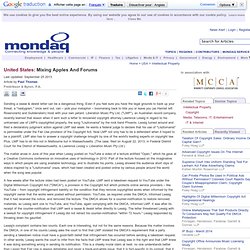
Lessig and the Electronic Frontier Foundation to sue music company for aggressive copyright takedown. The Digital Millennium Copyright Act (DMCA) specifically allows for holders of copyrights to notify YouTube that their Intellectual Property is on the site without their permission.
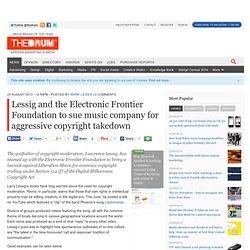
YouTube is then obliged to take down the offending video under Section 512 DMCA. Because of the DMCA, YouTube largely escapes liability for hosting infringing material until it is notified that the video is infringing and then has a reasonable amount of time to remove the video. The flip side for rights-owners is that if they make false claims about websites hosting infringing material, then they can be forced to pay damages under Section 512 (f).
Lessig challenges DMCA takedown notice. Yesterday Lessig - a well-known political activist and critic of the copyright system - retaliated, asking the US District Court for the District of Massachusetts to grant declaratory judgment, injunctive relief and damages.
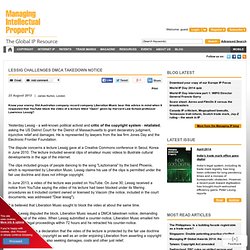
He is represented by lawyers from the law firm Jones Day and the Electronic Frontier Foundation. The dispute concerns a lecture Lessig gave at a Creative Commons conference in Seoul, Korea in June 2010. Lessig challenges DMCA takedown notice. Lessig and EFF Sue to Combat Improper Takedown Notice « American University Intellectual Property Brief. Home » Copyright, Daily Blog, Featured Someone sure picked the wrong person to send a takedown notice to.
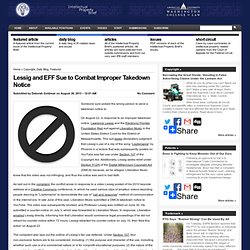
On August 22, in response to an improper takedown notice, Lawrence Lessig and the Electronic Frontier Foundation filed suit against Liberation Music in the United States District Court for the District of Massachusetts. This suit seeks declaratory judgment that Lessig’s use of a clip of the song “Lisztomania” by Phoenix in a lecture that was subsequently posted on YouTube was fair use under Section 107 of the Copyright Act. Additionally, Lessig seeks relief under Section 512(f) of the Digital Millennium Copyright Act (DMCA) because, as he alleges, Liberation Music knew that the video was not infringing, and thus the notice was sent in bad faith.
Lessig battles bogus takedowns. Liberation Music Throws Lessig a Meatball Pitch in “Lisztomania” DMCA Takedown Suit — Mass Law Blog. However, in the process he suffered something of a legal stutter-step that may come back to haunt him in this case.
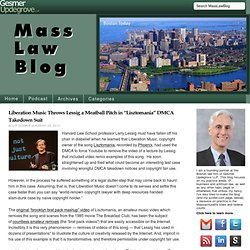
Assuming, that is, that Liberation Music doesn’t come to its senses and settle this case faster than you can say “world-renown copyright lawyer with deep resources handed slam-dunk case by naive copyright holder.” The original “brooklyn brat pack mashup” video of Lisztomania, an amateur music video which remixes the song and scenes from the 1985 movie The Breakfast Club, has been the subject of countless amateur remixes (the “brat pack videos”) that are easily accessible on the Internet. Fair use and DMCA take down—Lawrence Lessig sues over YouTube use of “Lisztomania”
One of the lurking issues in the murky waters of copyright fair use is the takedown notice provision of the Digital Millennium Copyright Act of 1998 (the “DMCA”).
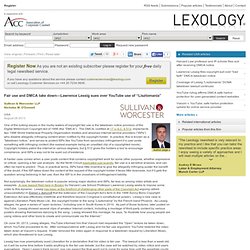
The DMCA, codified at 17 U.S.C. § 512, implements two 1996 World Intellectual Property Organization treaties and absolves internet service providers (“ISPs”) who disable allegedly infringing content when notified by the copyright holder. In practice, this is known as a “takedown notice,” and serves to protect ISPs like YouTube from secondary infringement if a user posts something with infringing content (the easiest example being an unedited clip of a copyrighted movie). Copyright holders patrol the internet to various degrees, but § 512 gives the holders a tool to encourage compliance, and ISPs a way not to be sued out of existence. A harder case comes when a user posts content that contains copyrighted work for some other purpose, whether expressive or critical, opening a fair use analysis.
Seminars 2012-2013 - Centre for Intellectual Property & Information Law. The CIPIL Intellectual Property Seminar Series brings together specialist speakers to discuss prevailing issues in relation to copyright, patents, trademarks, design rights, and other subjects. The Centre brings together a group of legal academics already recognised for their historical and inter-disciplinary, as well as doctrinal, research. Drawing on the resources of Cambridge University, CIPIL is ideally positioned to carry out and promote well-informed interdisciplinary work. Subject to speaker consent, the lecture component for each seminar will be made available on the University of Cambridge Streaming Media Service (SMS) and the Apple iTunesU platforms. Legal Resources - Centre for Intellectual Property & Information Law. A Guide to Happy (and Legal) Tumblr-ing. AHRC/SCRIPT - a law and technology centre at the University of Edinburgh sponsored by the Arts and Humanities Research Council.
Intellectual Property Foresight Forum. SCRIPTed: Online Journal.